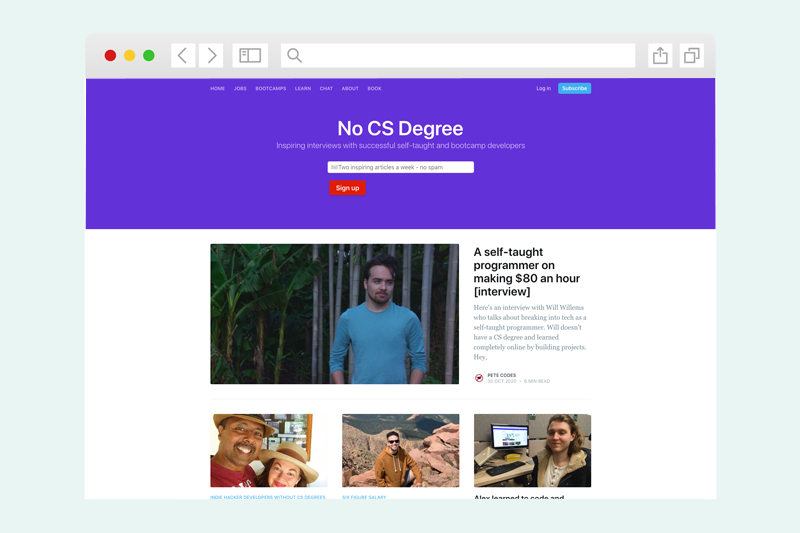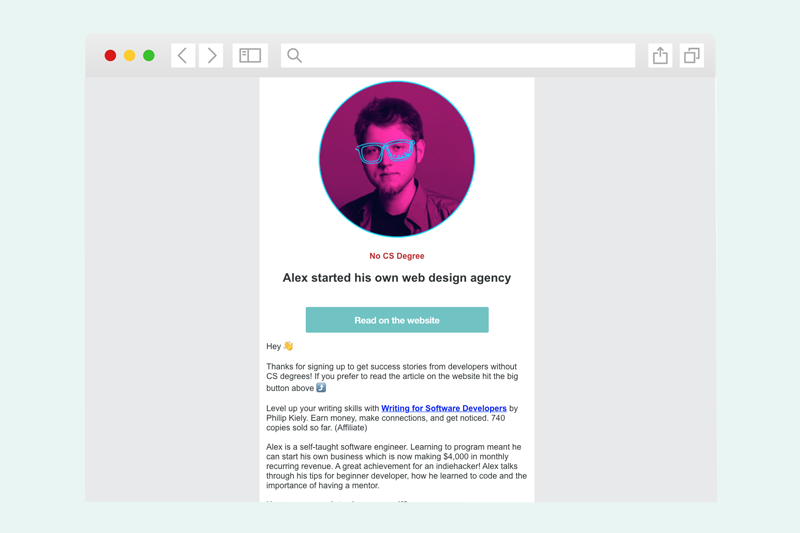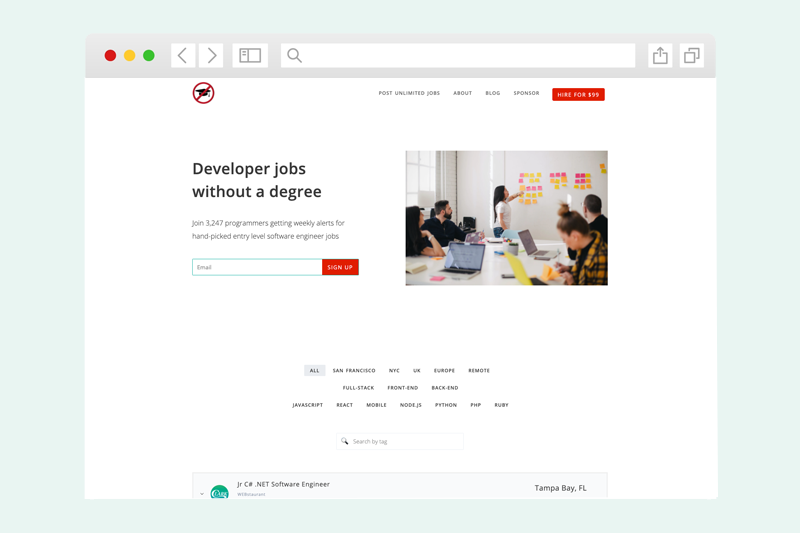Type “careers of the future” in your search bar and developers will appear in practically every list Google can throw at you. We’re now so reliant on computers that software developers, engineers and programmers have become some of the most sought-after roles in the tech industry.
But in the past, building a career in this sector required a four-year Computer Science degree. And being saddled with the university debt that comes with it.
However, things have changed.
In today’s modern world of fast-paced technology, it’s possible to learn how to code in a matter of months, through online bootcamps and Github repositories. A degree is no longer necessary.
And it’s this shift in accessibility that inspired Pete McLeod to start the No CS Degree website, newsletter and job board. More than that, No CS Degree has become a community for self-taught and bootcamp developers to learn, grow and share ideas.
We caught up with Pete to find out a little more about how he got started and where he hopes No CS Degree will take him.

Tell us a little about your background.
I studied Politics and Spanish at university, which was a lot of fun but not very helpful in getting a job. I did some work as a researcher in various jobs before deciding to go into entrepreneurship full time last year. I’m based in the lovely city of Edinburgh in Scotland and I work from my apartment.
I’m definitely part of the indie hacker movement so I prefer to build a business that I own myself and grow sustainably.
What motivated you to start No CS Degree?
I was starting to learn to code and looking for examples of people like me who hadn’t done Computer Science at university. Hanging out in Telegram groups I soon found out that a lot of people launching cool startups or making six figure incomes at companies had taught themselves coding online or had been to bootcamp.
I originally asked these people my own questions in private messages. And I could see lots of people were learning to code and sharing updates on Twitter. So I thought it would be great to create interviews from the people I knew. It snowballed from there into a job board and bootcamp directory.

How have you grown this project since its inception?
I started off with just a blog sharing success stories from developers. After a couple of months I added a jobs board. Earlier this year I made a list of coding bootcamps along with info, like which ones offer scholarships. I also published an ebook on imposter syndrome in June. I’ve got plans for new features this year including a service for finding mentors and letting developers post their resumé when they’re looking for work.
EmailOctopus is really simple to navigate so it just makes my life easier.
Pete Codes, founder of No CS Degree
Why did you choose EmailOctopus as your email marketing platform?
I first heard about EmailOctopus from Harry Dry who runs the Marketing Examples website. His recommendation was a big factor.
Once I starting trying out EmailOctopus I liked the simple user interface. Mailchimp is a pain to navigate and there’s a lot of menu-diving. EmailOctopus is really simple to navigate so it just makes my life easier.
It’s definitely a lot cheaper than Mailchimp so it’s saving me money every month too! Once you get off the free plan the costs of Mailchimp really start racking up so I was looking for a more affordable alternative.
Also, the customer support at EmailOctopus is a lot better – I don’t think the Mailchimp CEO would answer my emails!

What sort of engagement do you have from your subscribers?
I’ve had some really high open rates – in some cases over 50% with over 2,000 followers.
Lots of people reply to emails to say they love the newsletter, which is obviously great! I do encourage people to reply as it helps with motivation. A lot of the time with newsletters you are sending blogs out into the universe and so it’s good to get a response from people.
Sometimes people tell me about jobs they’ve got from my website, which is the best feeling ever to have helped someone like that!

What tips can you share with others to get the most out of EmailOctopus?
Definitely always test an email before sending it. This way you can hopefully catch any typos or mistakes. It also helps a lot to open your test email in Gmail. I used to just send a test to my private email but, of course, most people use something like Gmail. So it’s better to send one there and then see how most people will experience the newsletter.
I also have a dedicated page for collecting email sign ups, which I built with Carrd. The form then sends sign ups to EmailOctopus.
What other platforms do you use in your tech stack?
I would recommend using Zapier as a great time saver. For instance, I host my blog on Ghost and I collect email sign ups there, as well as via the EmailOctopus form. Zapier sends my newsletter sign ups stored in the Ghost system over to my EmailOctopus list.
I also deleted my Mailchimp list and kept the account just for the pop-up. This way I get a free pop-up option to collect emails and, again, I use Zapier to move this data to EmailOctopus. I then delete the subscriber data from Mailchimp to keep within the free limit.
Ghost is a great blogging platform, which I would recommend if you want to just stick to a newsletter. I’ve also used Sheet2Site, which is a no-code way of making a directory website from just a Google sheet as the database.
As I’m working on integrating my job board, blog, and bootcamp directory into one site I’m now making my own custom website with Django and Python. I would recommend either Simple Analytics or Fathom Analytics instead of Google Analytics – it means you aren’t tracking your users and is more respectful of their privacy. It also means, importantly for European users, you don’t need to display those annoying cookie banners.

Finally, what are your future goals for No CS Degree?
I have quite a lot of ideas of how I can help people that are learning programming and early stage developers. I’m working on building out more resources for finding the best online coding courses and I’d like to work with employers and find them developer talent.
In financial terms, I’d like to build up the revenue to $10,000 per month in the next year. Although, as long as I can continue to help inspire people to learn to code and help them find good jobs, I’m happy.
Sign up to the No CS Degree newsletter for your weekly developer interview or reach out to Pete on Twitter @petecodes


No Comments
Leave a comment Cancel